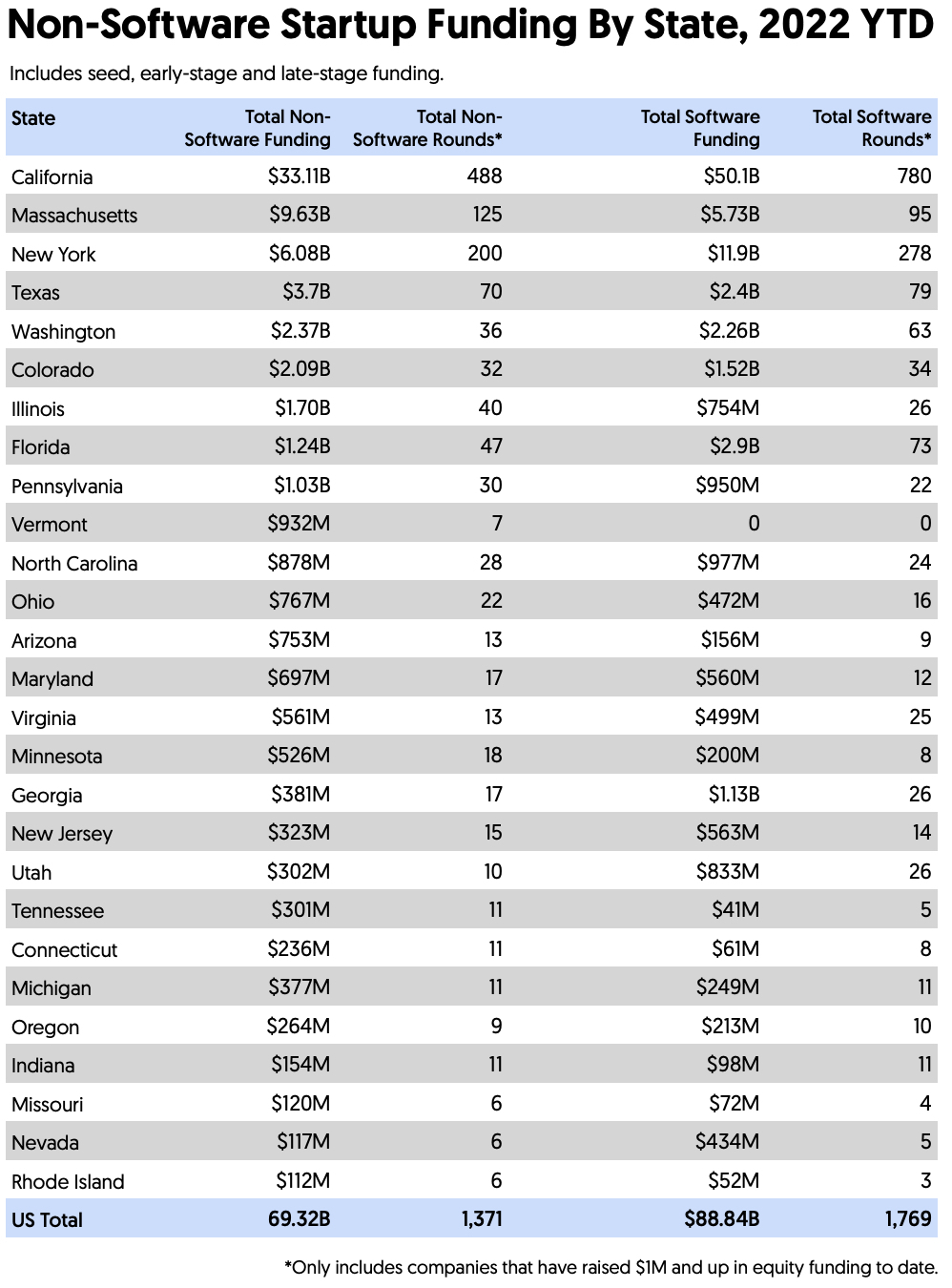Geographic funding breakdowns have long been a staple of startup coverage. How much did Silicon Valley companies raise? How about the Midwest? Or what about that burgeoning Florida scene?
Until a couple years ago, this seemed like a sensible lens for looking at data. Employees at seed through mid-stage startups tended to work at headquarters. Companies that got VC funding generally spent much of it scaling up in their hometowns.
Since the pandemic, however, this sort of geographic calculus no longer holds true. Instead, there’s a breakdown by industry. Software startups commonly operate fully or largely remotely. Companies with physical infrastructure are usually on-site.
Search less. Close more.
Grow your revenue with all-in-one prospecting solutions powered by the leader in private-company data.
With this shift in mind, we set out to explore a different kind of geographic funding analysis: One that separates companies in remote-work-leaning sectors and more infrastructure-heavy industries. Broadly, we call it “non-software startups” and “software startups.”
We broke this admittedly wonky dataset 1 down by state, to see which places lead in attracting the kinds of startups that tend to rely on manufacturing facilities, laboratories, energy installations and other physical infrastructure. We then compared total software funding for these same states.
Below we chart out the numbers for the 27 leading U.S. states for venture funding for the first seven months of the year:

So what do the numbers tell us? Here are some of the more intriguing findings:
1. Non-software startups dominate in Texas, Massachusetts and these other states: Of the six states that attract the lion’s share of startup funding, Texas and Massachusetts were the only two in which non-software companies raised a lot more than software companies.
For Massachusetts, an easy explanation is the Boston area’s historic strength in biotech, which accounts for a majority of the largest non-software rounds this year. Other sectors that attracted large rounds include energy and agtech.
Texas, known as a cost-competitive business location with a good tech talent base and room to sprawl, seems like a logical choice for infrastructure-heavy startups. So it’s not entirely surprising to see many of them pick the Lone Star State. Some of the state’s larger non-software funding recipients this year include The Boring Company, Firefly Aerospace and Infinitum Electric.
Other states where non-software deals attracted a clear majority of venture funding include Illinois, Ohio, Arizona, Minnesota, Tennessee, Connecticut and Vermont.
2. Software startups dominate in New York, Florida, Georgia and Utah: A few states also stand out as places where startups operating in the digital world tend to congregate.
New York City’s prominence as a finance center is evident in the state’s startup investment. The largest software funding recipients this year include Chainalysis, a blockchain analytics provider, Jeeves, an expense management platform, and Policygenius, an insurtech startup.
Meanwhile, two Southeastern states—Florida and Georgia—also saw more than two-thirds of startup funding this year go to software companies. And Utah, known as a major hub for the SaaS space, also unsurprisingly outperformed in software.
3. California dominates in everything, but leans toward software: California, the top state for startup funding, is the leading recipient of investment for both software and non-software startups.
However, the Golden State does lean a bit to the software side. Overall, software companies in the state pulled in over $50 billion in funding so far this year, compared to just over $33 billion for other startups.
4. Lots of states are in the middle: Not every state demonstrated a clear lean toward digital or physical infrastructure-focused startups. States with a fairly balanced mix included
Colorado, Washington, Pennsylvania, North Carolina, Maryland and Virginia. Broadly, these are places where we do see SaaS and fintech, but also strong biotech activity.
5. The majority of venture funding goes to software startups: Software certainly does seem to be eating the venture capital industry. Per Crunchbase data, over $88 billion went to U.S. software companies so far this year, compared to over $69 billion for the non-software startup category. And of course, the so-called non-software startups are also reliant on software too. They’re in that category because they also tend to rely on physical infrastructure beyond software.
Crunchbase Pro queries listed for this article
All Crunchbase Pro queries are dynamic, with results updating over time. They can be adapted by location and/or timeframe for analysis.
U.S. non-software startup funding query:
Illustration: Li-Anne Dias
We divided the universe of software and non-software startups using the Crunchbase industry group “software.” In addition, we added fintech, marketing, cybersecurity and financial services to the software category, in case companies in these spaces, which are predominantly software-focused, were not specifically categorized as software industry startups.
The resultant funding numbers give a general idea of the breakdown of pure software companies and more infrastructure-reliant companies. However, these are not rigid categories. There are some companies categorized as software that are also reliant on physical infrastructure. In some cases, we recategorized them. May Mobility, a Michigan-based robotics startup, for instance, was originally categorized by Crunchbase as a software company, but we moved it to the non-software category as it relies heavily on robotics hardware. We did the same for Oregon’s Agility Robotics. However, we did not apply this level of analysis to every major funding recipient.↩

Stay up to date with recent funding rounds, acquisitions, and more with the Crunchbase Daily.






![Illustration of a man sitting on a huge pile o' money. [Dom Guzman]](https://news.crunchbase.com/wp-content/uploads/Giant_Funding-470x352.jpg)

![Illustration of remote meet on cellphone, unicorn chess piece and money. [Dom Guzman]](https://news.crunchbase.com/wp-content/uploads/business-strategy-300x168.jpg)
![Illustration of toast with $ toasted in. [Dom Guzman]](https://news.crunchbase.com/wp-content/uploads/Forecast-dollar-sign-300x168.jpg)


67.1K Followers